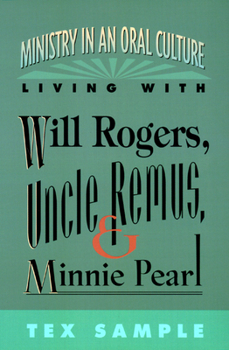Ministry in an oral culture
Select Format
Select Condition 
Book Overview
This book will help pastors educated in the literate culture of academia bridge the cultural gap between them and those in their congregations who verbalize their faith in proverbs and stories. Tex... This description may be from another edition of this product.
Format:Paperback
Language:English
ISBN:066425506X
ISBN13:9780664255060
Release Date:March 1994
Publisher:Westminster John Knox Press
Length:112 Pages
Weight:0.05 lbs.
Dimensions:0.3" x 6.2" x 8.0"
Customer Reviews
2 ratings
Say what?
Published by Thriftbooks.com User , 20 years ago
Tex Sample has made a career out of being a good public speaker - in teaching, preaching, and even entertainment venues, Sample is always able to relate to the people at their level, which is where ministry must begin. Sample's technique is tried and true - so much so, that it predates the written language. The Bible, as with many ancient cultures, derives from its earliest origins an oral culture and tradition of oral transmission. Many preliterate societies did this, and many cultures with low levels of literacy do this; however, one of the more surprising discoveries of people such as Sample is the degree to which all literate societies continue a tradition of oral transmission of knowledge, wit and wisdom - things that never get written down, yet always seem to be known. Perhaps the key example of this is Jesus - who never wrote a book, never penned a sermon that got passed along, and never mass produced lecture notes for his student-disciples to copy and memorise for the test. Sample draws on his own experience as a young person growing up in a culture in America that used oral traditions for the `important stuff', and literacy was reserved for official and necessary things like writing checks, filling out forms, etc. The real pieces of life, the stories of the family, the ways to do things, the expression of love and feeling, these were transferred from person to person orally. The early experiences of Sample relate to the title of his text - when he took his first philosophy course, he was expecting the home-spun `philosophy' of people like Will Rogers, wisdom stories like Uncle Remus, and oratory skills like Minnie Pearl. When he encountered Socrates, he liked what he read, but he wondered how much better things might have been had Socrates studied along with someone like Will Rogers. Sample continues to draw on his own experience in ministry, education, and family (key sources for any in the oral tradition) as well as the experiences of other oral cultures - Native Americans, ancient peoples, poor people, etc. Sample lays out different primary practices of those in an oral tradition - memorisation, apprenticeship-style learning, learning by concrete example. Think about the parables of Jesus here - a Good Samaritan, a mustard seed, a shepherd with sheep - these are easily identifiable and understandable figures, and the stories are simple enough to be memorised easily. Oral tradition puts tradition-and-practice over theory-and-praxis, highlights `storytelling' over narrative, looks for relationships and loyalty over the higher-minded concepts of community and solidarity. Oral tradition resists change, but at the same time welcomes adaptation, particularly when it makes for a better story! Sample begins and ends with stories. Characters often take on names significant for their attributes - Jimmy Hope may be a real name, or may not be, but it fits the hope-full aspect of the story very well, if it isn't his real name, it sh
A thought-provoking book about communication problems.
Published by Thriftbooks.com User , 26 years ago
Far from being a book about preaching a particular brand of faith, this work is a challenge to the "literate" portion of our culture, and the themes that Sample touches on are basic to the problems of communicating ideas (whether religious or scientific) between literate persons and those whose day-to-day education is gained from sources other than printed ones. He explores the phenomenon of "educated" persons dismissing the working class (who typically make up the oral culture) as backwards and superstitious, and the working class dismissing the former as impractical fools. Both the cause and result of this is a classic, two-sided I'm-talking-but-you-aren't-listening communications breakdown. The focus of this book is on understanding the true nature of oral culture as it affects the process of absorbing new ideas, new solutions and change in general. Sample's perspective on this is truly thought-provoking. I highly recommend it to anyone who laments the current state of our culture, because the general thesis of this book offers us way to deal with it.




